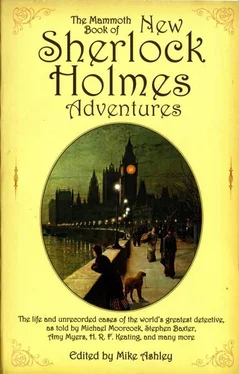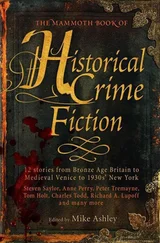Mike Ashley - The Mammoth Book of New Sherlock Holmes Adventures
Здесь есть возможность читать онлайн «Mike Ashley - The Mammoth Book of New Sherlock Holmes Adventures» весь текст электронной книги совершенно бесплатно (целиком полную версию без сокращений). В некоторых случаях можно слушать аудио, скачать через торрент в формате fb2 и присутствует краткое содержание. Жанр: Детектив, на английском языке. Описание произведения, (предисловие) а так же отзывы посетителей доступны на портале библиотеки ЛибКат.
- Название:The Mammoth Book of New Sherlock Holmes Adventures
- Автор:
- Жанр:
- Год:неизвестен
- ISBN:нет данных
- Рейтинг книги:5 / 5. Голосов: 1
-
Избранное:Добавить в избранное
- Отзывы:
-
Ваша оценка:
- 100
- 1
- 2
- 3
- 4
- 5
The Mammoth Book of New Sherlock Holmes Adventures: краткое содержание, описание и аннотация
Предлагаем к чтению аннотацию, описание, краткое содержание или предисловие (зависит от того, что написал сам автор книги «The Mammoth Book of New Sherlock Holmes Adventures»). Если вы не нашли необходимую информацию о книге — напишите в комментариях, мы постараемся отыскать её.
Marianne is an important fictional formulation of Sand's thinking on the role of women and the nature of democracy. This edition includes a long biographical preface which quotes extensively from her correspondences.
The Mammoth Book of New Sherlock Holmes Adventures — читать онлайн бесплатно полную книгу (весь текст) целиком
Ниже представлен текст книги, разбитый по страницам. Система сохранения места последней прочитанной страницы, позволяет с удобством читать онлайн бесплатно книгу «The Mammoth Book of New Sherlock Holmes Adventures», без необходимости каждый раз заново искать на чём Вы остановились. Поставьте закладку, и сможете в любой момент перейти на страницу, на которой закончили чтение.
Интервал:
Закладка:
The question was altogether unexpected. I hesitated for the briefest of moments while I considered how to inform my wife, then extended my hand. Sherlock Holmes clasped it in both of his own.
"Capital, Watson! We shall be occupied for two months at the very least. Inform your Harley Street patients to make other arrangements in your absence. As for my bees: until we return I can only hope that their new queen will rule wisely."
And so our adventure began. We sailed from Southampton on 12 May bound for New York City aboard a steamship aptly christened the New York. During the voyage, Sherlock Holmes kept his remarkable brain occupied with the game of observing our fellow passengers and deducing their origins, vocations and personalities from the clues offered by their physical appearances and behaviours.
We arrived in New York City's harbour on the morning of 19 May. There was still the wide continent of North America to be traversed, but Mayor Phelan had arranged for us to be granted passage on any of the US Army's relief trains bringing provisions and medical aid from NewYork to the refugee camps outside San Francisco. After clearing the New York customs house, health station, and currency exchange, Holmes and I secured a four-wheeler and made haste with our luggage north and east through Manhattan to the Pennsylvania station – for Holmes was determined to begin the long transcontinental railway journey as soon as possible.
By noon we reached the New York Central terminus, where Holmes was much distrait to be told that the next relief train did not embark until tomorrow morning. "There's nothing for it, Watson," he said. "We are obliged to spend a night in this metropolis. Let us quarter ourselves in an hotel, and then we shall see what diversions the island of Manhattan can offer us."
I took charge of the transfer of our bags to the Herald Square Hotel, on the south side of West Thirty-Fourth Street, whilst Holmes sent a telegram to Continental Insurance's main office. "I have cabled Mr Evans with the news that I shall be aboard tomorrow's train," Holmes informed me after I had dealt with the hotel's guest-register, "and I have told him that I am bringing with me the greatest field surgeon of my acquaintance."
"You flatter me, Holmes."
"I think not. Come, Watson! For this afternoon and evening, at least, let us seek such pleasure as this city affords, knowing that tomorrow morning our unpleasant task begins. In the telegraph office I overheard that Maude Adams is appearing in Peter Pan at the Empire Theatre in West Forty-Sixth Street. Let us spend tonight in Neverland, and give no thoughts to pain or San Francisco."
Sherlock Holmes and I proceeded northwards, up the wide Manhattan thoroughfare known as Broadway. Just south of West Thirty-Seventh Street, at Number 1367, Broadway, my attention was arrested by a brown stone building papered with gaudy posters. This proved to be the Edisonia Amusement Hall, and the posters outside advised us that, for five cents' admission, we might view an exhibition of Thomas Edison's miraculous invention, the Vitascope.
"I have heard of this machine, but never seen it in operation," I remarked to Holmes, with more than a hint of eagerness in my voice. "Mr Edison's Vitascope has gone one better than the magic-lantern: his invention can project images that actually move!"
" 'Invention', indeed!" Holmes remarked with an audible sniff. "Edison has no more invented the Vitascope than I have invented the wheel. Watson, the first kinetographic camera and projector were devised by Louis Le Prince, a Frenchman who dwelt in Yorkshire. I myself attended a demonstration of his apparatus in Leeds in 1888. But come: since you are clearly so keen to witness this Vitascope, let us pay the admission and enter."
The amusement hall's afternoon programme was well attended, but Holmes and I were able to secure two seats in the pit-stalls, conveniently adjoining the centre aisle. The stage of the amusement hall was bare, except for a large white
rectangular screen that seemed to afford no great promise of entertainment. The performance had not yet begun, and in the theatre seats all round us the audience were abuzz with a myriad of conversations. "I am no longer homesick for my bees." Holmes murmured to me, amid the general huzzbuzz. "It appears that we may converse freely without breaching etiquette, since everyone else in this place is talking anyway. Watson, I can never sit through a moving-picture exhibition without thinking of the strange case of James Phillimore."
For a moment the name meant nothing whatever to me, but then the penny dropped: "Wasn't he the man who vanished from his own house in Warwickshire?"
"The same." In the red plush seat beside me, Holmes sighed wearily. "One of my earliest failures, Watson. Following his vanishment in 1875, neither I nor anyone else ever clapped eyes on Mr James Phillimore again."
"Surely a man who vanished in 1875 could have nothing to do with moving-pictures," I proposed, "for they had not yet been invented."
Sherlock Holmes nodded. "Watson, I have told you that the kinetograph was invented in England by Louis Le Prince. In 1890, during a visit to his native France, Monsieur Le Prince consented to demonstrate his device at the Paris Opera House. In September of that year, he boarded a train at Dijon, taking his camera and projector into a first-class compartment. When the train reached Paris, Watson, that compartment was empty. Despite an exhaustive investigation, neither Le Prince nor his motion-picture apparatus were ever seen again."
"Astonishing!" I remarked.
"I had read of the case at the time, and offered my services to the French authorities," Holmes went on. "The Sûreté declined my offer. Still, to this day I can never view a kinetograph without thinking of its inventor's curious fate, and when I think of Le Prince's vanishment I am naturally put in mind of James Phillimore."
"Was Phillimore a friend of yours, Holmes?"
"I never met him," said my companion. "Phillimore's peculiar disappearance in 1875 aroused much attention at the time, and I journeyed to Leamington Spa to join the search for him. Among the furnishings in Phillimore's house in Tavistock Street was found a cabinet study of a man in his early thirties; his two banking colleagues identified this photograph as a likeness of James Phillimore. I obtained a copy of the portrait, and committed it to memory. Watson, for twenty years after his vanishment – even when my wanderings brought me to the gates of Lhassa and Khartoum – I never was able to pass through a crowd without searching amongst its constituents for the face of James Phillimore. But now, after thirty-one years, I am resigned that he has vanished forever."
At that moment the house lights dimmed, and the theatre audience fell silent. A man stepped forth upon the stage, and introduced himself to us as Mr Edwin Stanton Porter of the Edison Film Company. He assured us that the Vitascope possessed a full palette of diversions – comedies, dramas, nature studies – and that all of these would be on offer at this afternoon's performance.
"I particularly wish to draw your attention to the closing item on the bill," said Mr Porter to his wrapt audience. "This very morning, a Vitascope photographer set up his apparatus in the streets of Manhattan. He has captured true-life scenes of New York City, taken in natural sunlight. Ladies and gentlemen, the photographic record of those events has already been developed and shipped to this theatre, barely four hours after they occurred." An excited murmur went round the auditorium at this point. Mr Porter continued: "It is hoped that, in future, the Edison Film Company will devise a means by which any newsworthy event anywhere on the globe can be captured by Mr Edison's wonderful Vitascope, and projected onto screens throughout the planet instantaneously."
Читать дальшеИнтервал:
Закладка:
Похожие книги на «The Mammoth Book of New Sherlock Holmes Adventures»
Представляем Вашему вниманию похожие книги на «The Mammoth Book of New Sherlock Holmes Adventures» списком для выбора. Мы отобрали схожую по названию и смыслу литературу в надежде предоставить читателям больше вариантов отыскать новые, интересные, ещё непрочитанные произведения.
Обсуждение, отзывы о книге «The Mammoth Book of New Sherlock Holmes Adventures» и просто собственные мнения читателей. Оставьте ваши комментарии, напишите, что Вы думаете о произведении, его смысле или главных героях. Укажите что конкретно понравилось, а что нет, и почему Вы так считаете.












